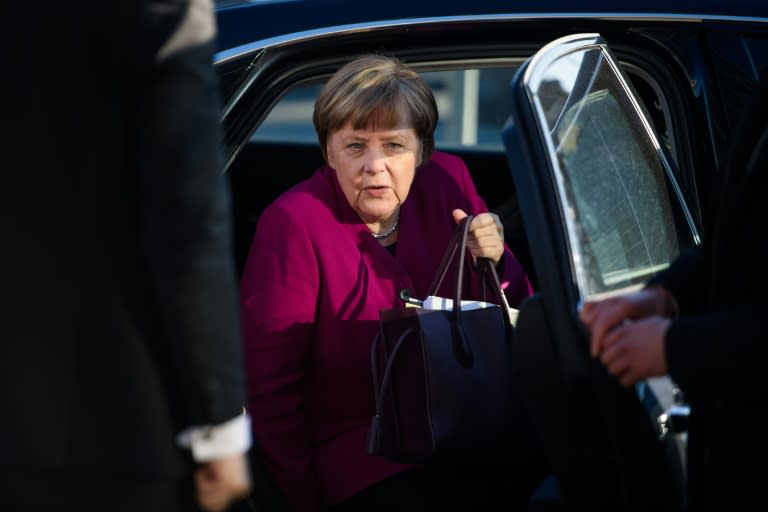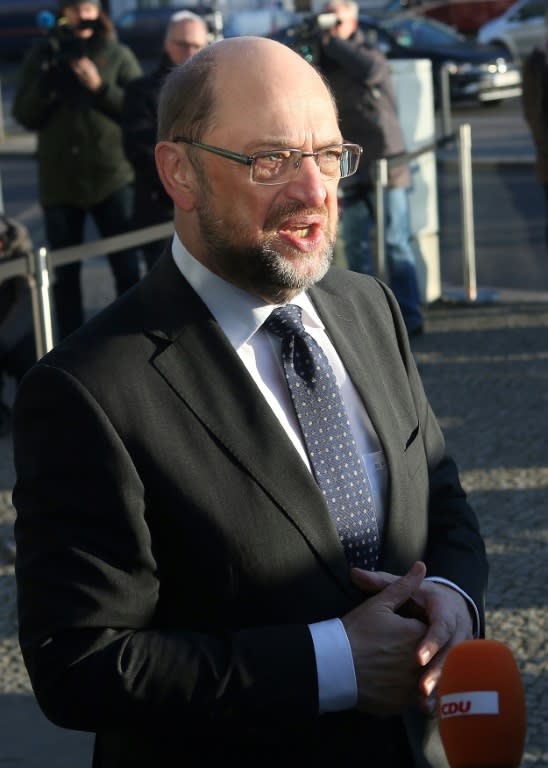Relieved Merkel clinches hard-fought deal on new government
German Chancellor Angela Merkel's conservatives and the Social Democrats sealed a deal on a new coalition Wednesday, potentially ending four months of political deadlock in Europe's top economy. Following days of marathon negotiations, a relieved Merkel told reporters the agreement would create "the good and stable government that our country needs and that many in the world expect from us". After extracting several hard-fought concessions in the final spurt, Martin Schulz said he was stepping down as leader of the centre-left Social Democratic Party (SPD) and wanted to become foreign minister in the new government. The coalition breakthrough will come as a relief to Germany's EU partners as the bloc faces tough negotiations on migration and Brexit. Merkel, Europe's most experienced leader, has seen her standing at home and abroad weakened by the longest stretch of coalition-building in the country's postwar history. But before she can be sworn in, a final hurdle looms: the "grand coalition" pact between her CDU/CSU bloc and the SPD must still be approved by the SPD's 460,000 members in an upcoming postal ballot. - Divvying up posts - Germany has been stuck in political limbo since September's inconclusive general election saw mainstream parties bleed support to the far-right AfD, which tapped into anger over Merkel's liberal refugee policy. After a failed attempt to forge an untried alliance with two smaller parties, Merkel opted to woo back the reluctant SPD -- her junior partner for two of her three terms since 2005. Schulz responded by abandoning his post-election vow to renew the party in opposition -- a U-turn that angered many. But a copy of the coalition agreement obtained by AFP indicated that he was able to extract a high price from the conservatives in the final round of talks including control of the powerful finance and foreign ministries, as well as the labour, family affairs, justice and environment portfolios. Julian Reichelt, editor-in-chief of the influential Bild daily, called it "the first SPD government led by a CDU chancellor". Merkel admitted the debate on the division of ministries "wasn't easy" while Schulz held up the coalition deal as bearing "the strong signature of the Social Democrats". Former European Parliament chief Schulz said he intended to take over the foreign ministry and was giving up the SPD leadership after just over a year in the role. He tapped the SPD's popular parliamentary group leader Andrea Nahles as his replacement. "The party has to become younger and more female," he told reporters, flanked by Nahles. Meanwhile the finance job could go to the popular mayor of northern port city Hamburg, pro-business centrist Olaf Scholz, often eyed as a potential SPD chancellor candidate. The change could mean a mild shift away from the austerity imposed at home and abroad by former finance minister Wolfgang Schaeuble, although the parties agreed to stick to a balanced budget policy. - SPD holds the keys - But before anyone can take up their posts in a new Merkel-led cabinet, the SPD's rank-and-file have to give their blessing to the coalition pact. Observers expect the vote to be tight, with the SPD's left and youth wings fiercely opposed to another four years governing in Merkel's shadow. The outcome of the yes-or-no referendum is expected on March 4. A green light could see a new government in place by the end of next month. A thumbs-down could see the country headed for fresh elections or leave Merkel at the helm of an unstable minority government -- a prospect she has baulked at. - Focus on Europe - Schulz put a fairer Europe at the heart of his negotiating efforts, insisting that Berlin must join French President Emmanuel Macron's push to deepen eurozone integration. According to the coalition deal, the parties agreed to support Macron's reform drive and tentatively backed his idea of a eurozone investment budget. On the hot-button topic of migration, the two camps said they would aim to limit the annual intake to 180,000-220,000 people, a key CSU demand. CSU leader Horst Seehofer is also set to take control of a revamped homeland security ministry. The SPD however won assurances that family reunifications for refugees would resume in August, restricted to 1,000 people a month. An SPD push to overhaul the two-tier healthcare system also yielded results, with a new commission set to examine levelling out doctor pay under statutory and private insurance schemes. But the protracted haggling has left its scars, and surveys suggest the two camps could lose their majority if a "no" vote from SPD members sends the country back to polling booth.



